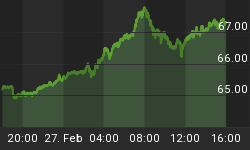While the world's attention has been focused on the physical destruction wrought by the Japanese earthquake and tsunami, the desperate attempts to contain the fallout from the shattered Fukushima Daiichi plant, and the daunting problems that Japan faces in rebuilding its infrastructure, few have truly illustrated how long-lasting and widespread the radiation's effects may be. There has also been little mention of how large radiological events affect economies of countries outside the immediate fallout zone. In truth, the disaster could make as much of an impact on investors in New York, London, or Sao Paolo as it makes on an investor in Tokyo.
The world's most significant nuclear accident occurred 25 years ago at Chernobyl, Ukraine. Although its effects are now well-documented, many forget how thoroughly the damage was covered up at the time. To avoid panic, the Soviet authorities grossly downplayed the risks to those living near the plant, as well as those who lived hundreds, and even thousands, of miles away. In the months that followed, high levels of radiation were detected as far away as Scotland!
While we can hope that the present-day Japanese are more prone to candor than the Cold War-era Soviets, a series of botched and contradictory communications from Tokyo Electric Power, the operator of the plant, and the Japanese government have given us reasons to worry.
As higher levels of radiation are found in Japanese fish and vegetables, there is a growing suspicion that the full effects of the radioactive release have been downplayed to the public. It is becoming increasingly impossible to keep the concern from spreading beyond the islands of Japan. Pacific fishing companies and mainland Asian agricultural concerns are under heavy scrutiny.
The accident will inevitably alter long-term energy planning around the world. The growing political traction that nuclear power has gathered over the last decade or so, as the price of fossil fuels has climbed, may be irrevocably damaged. With so-called "green" energy unable to replace the wattage that will be lost by a waning nuclear sector, look for the traditional fossil fuels to fill the breach. But the effects of Japan's nuclear accident go beyond health and energy policy.
After the EU, US, and China, Japan has the fourth largest economy in the world. Japanese industry provides many of the high-tech systems that are essential for producing relatively low-tech products such as automobiles. Already the US computer industry is being affected by shortages of vital parts manufactured in Japan.
But the financial fallout from the crisis looms even larger than the health, energy, or industrial issues. The Japanese people are stoic, disciplined, and very hardworking. Recovery in Japan is likely to be faster than many expect. However, in order to repair the flood, quake, and nuclear damage, Japan will likely need to spend trillions of dollars (hundreds of trillions of yen). This is the crisis that may sink the developed world.
For decades, Japan has deeply indebted itself through central banking strategies pioneered by America and Europe. Faced with successively deeper recessions, it has prevented industrial restructuring by funding industrial failure. By reducing interest rates to near zero and boosting government spending, Japanese governments have progressively transferred the unserviceable debts of the country's private sector to the public ledger. The result is that Japan's debt, currently standing above 200 percent of GDP, is heading for 300 percent by 2020, or some 20 times its tax revenues. Facing such statistics, the rating agencies have placed Japan on "credit watch." This leaves Japan with few options for raising the money to repair its industry and infrastructure.
If the Japanese start to draw on their national savings by selling part of their $882 billion of US Treasuries, they risk igniting a dollar-selling stampede and a damaging spike in US interest rates. To avoid this, it is highly likely that Japan will yield to American pressure not to sell any of its Treasury holdings. It is likely Japan has already been assured covertly, by the Fed and other G-7 central banks, of massive currency swap arrangements to come. This technique would allow for a more orderly repatriation of funds but would send many confusing signals into the financial markets - and lead inevitably to dangerous speculations.
For a world awash in debt, the Japanese destruction comes at an inopportune time. Unfortunately, authorities on both sides of the Pacific are as dishonest about these debt problems as Tokyo Electric Power has been about the severity of the crisis at Fukushima Daiichi.
Subscribe to Euro Pacific's Weekly Digest: Receive all commentaries by Peter Schiff, Michael Pento, and John Browne delivered to your inbox every Monday.
Click here for free access to Euro Pacific's new special report: What's Ahead for Canadian Energy Trusts?
Be sure to pick up a copy of Peter Schiff's just-released economic fable, How an Economy Grows and Why It Crashes. Click here to learn more and order.















